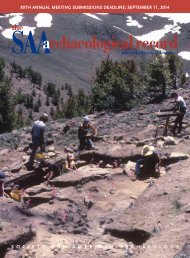SAA
SAA_Record_Nov2015
SAA_Record_Nov2015
Create successful ePaper yourself
Turn your PDF publications into a flip-book with our unique Google optimized e-Paper software.
PROS AND CONS OF CONSULTING COLLECTORS<br />
PRIVATE PROPERTY RIGHTS VERSUS<br />
HERITAGE OWNERSHIP<br />
THE CONFLICT BETWEEN INDIVIDUAL AND COLLECTIVE RIGHTS<br />
Joe Watkins<br />
Joe Watkins is in the National Park Service, Takoma Park, Maryland.<br />
To Collect or Not to Collect…?<br />
With profound apologies to Shakespeare, that is the question.<br />
Is collecting in the United States “okay”? If we preclude<br />
modern commercially made metal arrowheads or those<br />
made by hobbyists or flint-knappers, projectile points generally<br />
come from archaeological sites produced by American<br />
Indians. They are items from a cultural heritage that<br />
includes a time depth that extends for centuries before European<br />
and other entradas onto this continent. Materials collected<br />
by professional archaeologists from public land have<br />
legal protections that provide for the public to benefit from<br />
investigations, whereas materials collected by private individuals<br />
from private lands do not.<br />
Why should land ownership play a role in telling about the<br />
heritage of American Indians?<br />
Who “Owns” Heritage?<br />
Should private landowners be able to “own” the material<br />
manifestations of another culture or should the national government<br />
be able to control ownership of the heritage of the<br />
previous inhabitants of this land who have come under its<br />
control? Should heritage belong to the entire nation, to the<br />
descendants of those whose cultures originally created the<br />
material remains of their culture, or to the highest bidder (in<br />
one form or another)?<br />
Most European heritage laws place the ultimate ownership<br />
of heritage materials with the ruling government; the<br />
landowner does not “own” artifacts found on his property<br />
(with limited exceptions), the country does. In this manner,<br />
the “heritage” of the country within which the materials are<br />
found contribute to the knowledge about the specific country’s<br />
past, and people understand the processes involved in<br />
ensuring that the artifacts’ contribution is recorded. It is also<br />
presumed a priori that the people who created the material<br />
culture found within the borders are contributors to the<br />
national heritage.<br />
In most European countries, there is a notable exception to<br />
the rule regarding artifacts that are found on a landowner’s<br />
property: treasure troves. In the United States, however,<br />
property rights of individuals extend to any archaeological<br />
sites (and the material culture) found on their property, and<br />
the landowner is seen as the legal owner of objects that rightly<br />
might be considered to be a part of the national heritage.<br />
Any materials found on a person’s private property (unless<br />
precluded by a legal instrument or a separate mineral deed)<br />
belong to the property owner, including any “treasure.” Additionally,<br />
and perhaps more problematically, there is a marked<br />
and easily recognized differentiation between the materials<br />
created by the people who lived on the continent prior to the<br />
influx of colonists.<br />
United States Heritage Law<br />
The federal laws that are used to protect “America’s” heritage<br />
are generally applicable only to federal and tribal land, to federal<br />
actions, or to actions that require a federal permit. None<br />
of these laws, however, extend any aspect of governmental<br />
“ownership” or control over heritage materials on private<br />
land. This inability to protect what should be considered<br />
national heritage even if it is found on private property is, in<br />
my opinion, a grievous short-coming of federal preservation<br />
law.<br />
While the general question of “Who owns heritage?” has a<br />
legal answer (at least in terms of property law), there still<br />
exists a moral question: “Can an individual have the ‘right’ to<br />
own cultural heritage?”<br />
14 The <strong>SAA</strong> Archaeological Record • November 2015




